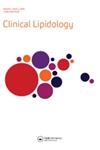Genetic screening to improve the diagnosis of familial hypercholesterolemia
Q Medicine
引用次数: 2
Abstract
Abstract Familial hypercholesterolemia (FH) is a common inherited disorder that causes premature atherosclerosis due to defective clearance of LDL. With current mutation screening strategies, the success rate of finding a causative LDLR or other mutation in a clinically diagnosed FH patient is approximately 70–80%. High-throughput next-generation sequencing approaches are now being introduced to not only identify mutations in genes not previously suspected to be important to FH, but also to screen the currently known gene variants more comprehensively with greater success. Where conventional methods have failed to disclose a causative mutation in one of the known genes, a polygenic mode of inheritance has been proposed to account for FH in these ‘mutation-negative’ patients. Identifying the precise molecular basis of the disorder is important for family cascade screening as well as to optimize treatment and clinical management, thereby preventing the otherwise fatal consequences of undiagnosed and untreated FH.遗传筛查提高家族性高胆固醇血症的诊断
家族性高胆固醇血症(FH)是一种常见的遗传性疾病,由于LDL清除缺陷导致过早动脉粥样硬化。在目前的突变筛查策略下,在临床诊断为FH的患者中发现致病性LDLR或其他突变的成功率约为70-80%。高通量新一代测序方法现在被引入,不仅可以识别以前未被怀疑对FH重要的基因突变,还可以更全面地筛选目前已知的基因变异,并取得更大的成功。在传统方法无法揭示已知基因之一的致病突变的情况下,已经提出了一种多基因遗传模式来解释这些“突变阴性”患者的FH。确定该疾病的精确分子基础对于家庭级联筛查以及优化治疗和临床管理非常重要,从而防止未确诊和未经治疗的FH的其他致命后果。
本文章由计算机程序翻译,如有差异,请以英文原文为准。
求助全文
约1分钟内获得全文
求助全文
来源期刊

Clinical Lipidology
生物-生化与分子生物学
CiteScore
0.44
自引率
0.00%
发文量
0
审稿时长
6-12 weeks
期刊介绍:
The Journal of Clinical Lipidology is published to support the diverse array of medical professionals who work to reduce the incidence of morbidity and mortality from dyslipidemia and associated disorders of lipid metabolism. The Journal''s readership encompasses a broad cross-section of the medical community, including cardiologists, endocrinologists, and primary care physicians, as well as those involved in the treatment of such disorders as diabetes, hypertension, and obesity. The Journal also addresses allied health professionals who treat the patient base described above, such as pharmacists, nurse practitioners and dietitians. Because the scope of clinical lipidology is broad, the topics addressed by the Journal are equally diverse. Typical articles explore lipidology as it is practiced in the treatment setting, recent developments in pharmacological research, reports of treatment and trials, case studies, the impact of lifestyle modification, and similar academic material of interest to the practitioner. While preference is given to material of immediate practical concern, the science that underpins lipidology is forwarded by expert contributors so that evidence-based approaches to reducing cardiovascular and coronary heart disease can be made immediately available to our readers. Sections of the Journal will address pioneering studies and the clinicians who conduct them, case studies, ethical standards and conduct, professional guidance such as ATP and NCEP, editorial commentary, letters from readers, National Lipid Association (NLA) news and upcoming event information, as well as abstracts from the NLA annual scientific sessions and the scientific forums held by its chapters, when appropriate.
 求助内容:
求助内容: 应助结果提醒方式:
应助结果提醒方式:


